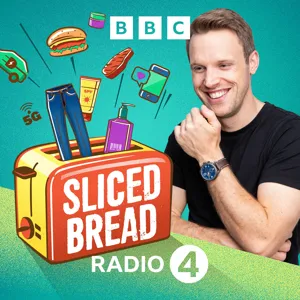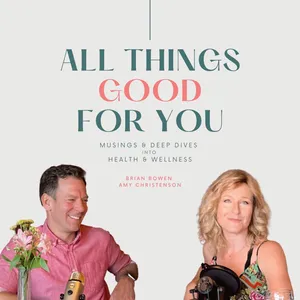Podcast Summary
Leveraging LinkedIn for Hiring Great Candidates: 70% of LinkedIn users aren't actively job hunting, making it an effective platform for small businesses to find top talent.
LinkedIn is a valuable resource for small businesses looking to hire professionals, as over 70% of its users don't visit other leading job sites. This means that great candidates, like Sandra who was mentioned in the podcast, can be found on LinkedIn who might not be actively looking for a new job but could be open to the perfect role. The importance of using LinkedIn for hiring was emphasized in the discussion. Additionally, the podcast explored the effectiveness of sports pain relief gels, creams, and sprays. Three-time Olympic medalist and heptathlete Kelly Sotherton shared her experiences with training for multiple events and the pressure it puts on the body, leading to regular pain. She emphasized the importance of having a smart coach, good planning, and listening to your body to handle the demands of training for seven events. The discussion also touched upon the effectiveness of these pain relief products, with the conclusion being that more research is needed to determine their true benefits.
Exploring Topical Pain Relief for Elite Athletes: Elite athletes face unique pain management challenges and may benefit from tailored training and topical pain relief methods like cooling gels, warming sprays, and patches.
Elite athletes, like the interviewee in this discussion, face unique challenges in managing pain and injuries, requiring tailored training and various forms of pain relief. The interviewee shares their personal experience of pushing their limits in track and field events, leading to injuries that caused long-term issues. Before major injuries, they relied on epidural injections for pain relief, alongside other medications. Now, we focus on exploring topical pain relief products as potential solutions for managing lower-level sports pain. The interviewee is joined by experts Dr. Benjamin Ellis and Professor Michael Callaghan to discuss various pain definitions and the evidence behind topical pain relief methods. The interviewee mentions using cooling gels, warming sprays, and patches, but had only used Voltarol gel extensively. The conversation will delve into the effectiveness and potential benefits of these products, shedding light on how athletes and individuals can better understand and manage their pain.
Exploring the Enjoyable Side of Pain: Acute Pain and Inflammation: Acute pain results from injury and is managed through inflammation, which can be alleviated by over-the-counter pain relief gels like Voltarol containing NSAIDs such as diclofenac, which penetrates deeper layers to reduce inflammation and pain
Pain, often seen as an unpleasant experience, can also have enjoyable aspects, such as the sensation from a hot curry. Acute pain, which is our focus, is short-term pain caused by injury. The body responds to injury by inflammation, which is painful and involves the body sending messengers to heal the injury. Over-the-counter pain relief gels like Voltarol, which contains diclofenac, can penetrate the skin and reach deeper layers to alleviate inflammation and pain. Diclofenac is a non-steroidal anti-inflammatory drug (NSAID) that is effective in treating acute pain by reducing inflammation. The ability of these gels to dissolve in both fat and water allows the active ingredient to reach the affected area, providing relief.
Effectiveness of Topical Pain Relief for Musculoskeletal Discomfort: Topical pain relief can deliver drugs directly to the affected area, potentially reducing side effects and amount absorbed into the bloodstream. Studies suggest it's effective for joint pain, but evidence for back pain is limited. Factors like body size, muscle mass, and skin temperature impact absorption.
Topical pain relief applications can be more effective than oral medication in delivering the drug directly to the affected area, reducing the amount that enters the bloodstream and potentially minimizing side effects. Studies have shown that topical applications of pain relief drugs like diclofenac can penetrate deep into the joints, making it a viable option for those undergoing joint surgery. However, it's important to note that the evidence supporting the use of topical pain relief for conditions like back pain is limited. Factors such as body size, muscle mass, and skin temperature can impact the absorption and effectiveness of topical applications. Personal experiences, like Kelly's, suggest that topical pain relief can provide temporary relief for muscle spasms and discomfort, but may not address the underlying issue. Overall, topical pain relief offers a targeted approach to pain management, potentially reducing the need for oral medication and its associated side effects.
Pain relief treatments don't address underlying cause: While pain relief creams and gels can offer temporary relief, they don't impact inflammation or healing process. Keeping active and moving, along with proper application, can aid in pain management and overall recovery.
While pain relief treatments like creams and gels can provide temporary relief from symptoms, they do not address the underlying cause of pain or inflammation. Inflammation is a natural part of the healing process, and there is no evidence that reducing inflammation with these treatments slows down healing. However, keeping active and moving, while being careful not to put too much strain on injured areas, can help manage pain and improve overall recovery. Additionally, there is evidence that the rubbing or massaging of the skin during application can provide some benefit on its own. It's important to note that the placebo effect, or the belief that a treatment is effective, can also play a role in the perceived benefits of these pain relief treatments.
The Placebo Effect and Its Impact on Pain Relief: The placebo effect significantly influences pain relief from treatments like paracetamol, with up to 80% of its effect being due to the mind. Topical NSAIDs like diclofenac have proven more effective than placebo for chronic pain, but long-term benefits are uncertain. Presentations and clinician attitudes can also impact the placebo effect.
The placebo effect plays a significant role in the perceived pain relief from various treatments, including medications like paracetamol, which has been shown to have an 80% placebo effect. The color of pills, branding, and even taking multiple placebo pills can increase the placebo effect. For medical treatments to be marketed as effective, they must demonstrate superiority over placebo. Topical NSAIDs like diclofenac have been proven to be more effective than placebo for reducing pain due to chronic musculoskeletal conditions. However, the long-term benefits beyond 12 weeks are uncertain. The way treatments are presented to patients, including the clinician's attitude, can also impact the placebo effect. The placebo effect is a complex phenomenon that can influence the perceived efficacy of treatments. It's important for individuals to have open and honest discussions with their healthcare providers about the potential benefits and side effects of various treatments.
Warming sprays may provide temporary relief from surface-level discomfort but have limited evidence for deep tissue pain relief: Despite claims, warming sprays have limited scientific support for reducing deep tissue pain or reaching affected bones, and experts do not recommend them for pain relief, especially for those with conditions like osteoarthritis
While warming sprays, such as the one being discussed, can provide temporary relief from surface-level muscle or joint discomfort through skin irritation and increased blood flow, there is limited scientific evidence to support their effectiveness in reducing deep tissue pain or reaching the affected bones. The active ingredients, including salicylates, work by irritating the skin and causing a local inflammatory response, which results in a warming sensation. However, this superficial effect may not be beneficial for those seeking pain relief in deeper tissues. The evidence supporting the use of warming sprays for pain relief is mixed, with older, lower-quality studies suggesting potential benefits but more recent, larger studies failing to show the same results. Ultimately, the consensus from experts, including the National Institute for Health and Care Excellence (NICE), is that these sprays should not be recommended for pain relief, especially for those with conditions like osteoarthritis.
Topical pain relief products provide relief for joint pain: Topical pain relief products like hot water bottles, warming sprays, capsaicin cream, and Bio-Freeze can effectively alleviate joint pain by relaxing muscles, improving blood flow, and in the case of capsaicin, depleting pain fibers of substance P. Regular use for several weeks is most effective.
Topical pain relief products, including hot water bottles, warming sprays, and capsaicin cream, can provide effective relief for joint pain. These products work by relaxing muscles, improving blood flow, and in the case of capsaicin, depleting pain fibers of substance P. Warming sprays, which have been marketed for decades, have widely accepted efficacy, despite some studies focusing on low concentration active ingredients and acute conditions. Chili peppers, which provide a warming effect similar to warming sprays, contain capsaicin, an extract used in clinical practice for conditions like osteoarthritis and nerve pain. Capsaicin works by reducing pain sensations and is most effective when used regularly for several weeks. Bio-Freeze, a topical pain relief gel, spray, or patch, offers both warming and cooling effects and can be a good alternative to oral analgesics for some individuals.
Topical pain relief through cooling: Biofreeze and similar products temporarily ease pain through skin cooling and placebo effect, but they don't change tissue conditions.
Topical pain relief products like Biofreeze provide temporary relief from minor muscle and joint aches and pains through the active ingredient isopropyl alcohol, which evaporates and cools the skin. The placebo effect of bright colors and the sensation of cooling may also contribute to the perceived benefits. The use of ice in the RICE method for injury treatment is still recommended, as it helps reduce inflammation and limit damage to the injured tissue. While cryotherapy and topical cooling products may have deeper effects, topical Biofreeze products can only cool the skin. The cooling sensation can numb the area and reduce nerve conduction velocity, but it does not change what's happening in the tissues beneath the skin.
Effectiveness of Topical Pain Relief Products: Voltarol gel, which contains diclofenac, has good evidence for pain relief, while menthol and camphor's effectiveness is less clear. Try topical products for pain relief, but don't replace medical treatment. Prevent injuries and use topical gels for rehabilitation if needed.
Topical pain relief products, such as Voltarol heating spray, cooling gels, and those containing menthol or camphor, have varying levels of scientific evidence supporting their effectiveness. Voltarol gel, which contains the active ingredient diclofenac, has good evidence for its use in treating pain, particularly in acute injuries and osteoarthritis. However, the evidence for the effectiveness of menthol and camphor, which are often found in cooling gels and warming sprays, is less clear, especially when it comes to inflammation-related pain. Experts recommend trying these products if desired, but they should not replace proper medical treatment. A top tip for managing muscle pain is to avoid injury in the first place and, if injured, to treat the pain enough to keep going and then focus on rehabilitation to prevent future injuries. If pain is interfering with daily activities, topical non-steroidal anti-inflammatory gels, such as those containing diclofenac or ibuprofen, may be helpful. As always, it's important to join the conversation and share your experiences with these products on social media using the hashtag #BBCslicedbread.
Be skeptical of health claims on social media: Check with experts or do research before trusting bold health claims on social media. Look into supplementary insurance for medical expenses and consider convenient gift-giving options.
It's important to be skeptical of bold health claims made on social media and to look for evidence before making a decision. I.e., if you come across a product or treatment that promises miraculous results, consider checking with experts or doing your own research before jumping in. Additionally, there's a podcast called "Curious Cases of Rutherford and Fry" where doctors Adam Rutherford and Hannah Fry investigate everyday science mysteries sent in by listeners. And for those looking for health insurance, UnitedHealthcare's Health ProtectorGuard fixed indemnity insurance plans can help supplement primary insurance plans and make managing medical bills easier. Lastly, for those who enjoy giving gifts, Celebrations Passport from 1800flowers.com can help make gift-giving more convenient and rewarding.






